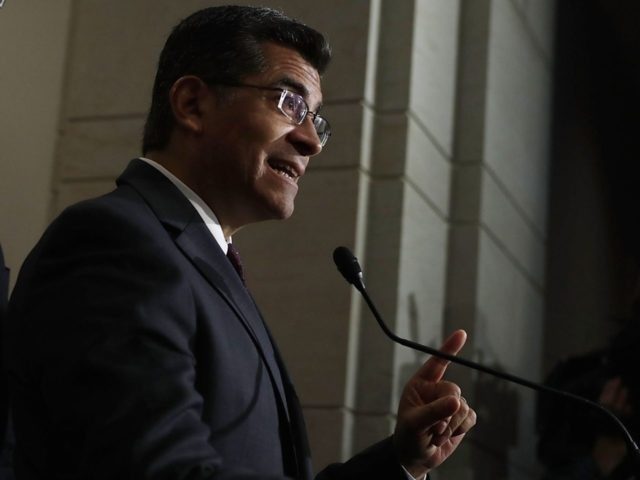The State of California and fifteen other states sued President Donald Trump on Monday over his declaration Friday of a national emergency and his plans to redirect federal funds to the construction of a wall on the southern border.
The lawsuit, as expected, was filed by California Attorney General Xavier Becerra, and was joined by attorneys general from “Colorado, Connecticut, Delaware, Hawaii, Illinois, Maine, Maryland, Michigan, Minnesota, Nevada, New Jersey, New Mexico, New York, Oregon and Virginia — all of which have Democratic attorneys general and all but one of which are led by Democratic governors,” the Wall Street Journal noted Monday.
However, ten of the 26 Democrat attorneys general have not joined the lawsuit — at least not yet, as of Tuesday.
The complaint, filed in federal court in the Northern District of California, decries what it calls “President Donald J. Trump’s flagrant disregard of fundamental separation of powers principles engrained in the United States Constitution.” It adds:
Contrary to the will of Congress, the President has used the pretext of a manufactured “crisis” of unlawful immigration to declare a national emergency and redirect federal dollars appropriated for drug interdiction, military construction, and law enforcement initiatives toward building a wall on the United States-Mexico border. This includes the diversion of funding that each of the Plaintiff States receive.
The complaint continues through several familiar talking points from the Democratic Party:
The federal government’s own data prove there is no national emergency at the southern border that warrants construction of a wall. Customs and Border Protection (“CBP”) data show that unlawful entries are near 45-year lows. The State Department recognizes there is a lack of credible evidence that terrorists are using the southern border to enter the United States. Federal data confirm that immigrants are less likely to commit crimes than are native-born Americans. CBP data demonstrate that dangerous drugs are much more likely to be smuggled through, not between, official ports of entry—rendering a border wall ineffectual at preventing their entry into this country.
Later in the complaint, the states claim that the border wall is not only unnecessary, but that it will also cause environmental damage. The complaint also claims a border barrier will not block “drug smuggling corridors.”
President Trump said Friday that, following earlier patterns, he expected a legal challenge in California, to lose there and in the liberal Ninth Circuit, and then to prevail at the Supreme Court, where conservatives hold a 5-4 majority.
Unlike President Barack Obama’s invocation of executive powers to declare the Deferred Action for Childhood Arrivals (DACA) and Deferred Action for Parents of Americans (DAPA) programs, Trump’s use of emergency powers is arguably within the powers assigned to him by the Constitution and delegated to him by Congress under the National Emergencies Act of 1976, according to analysis by Breitbart News legal editor Ken Klukowski.
Many experts agree. The Journal notes that “courts have been reluctant to second-guess the president on national-security matters,” and quotes liberal constitutional law professor Mark Tushnet of Harvard as saying that the case is “not a slam dunk” for the states, though he added he believes there is a “decent chance” that they could prevail.
The case is State of California et al v. Trump et al, number 3:19-cv-00872, Northern District of California.
Joel B. Pollak is Senior Editor-at-Large at Breitbart News. He is a winner of the 2018 Robert Novak Journalism Alumni Fellowship. He is also the co-author of How Trump Won: The Inside Story of a Revolution, which is available from Regnery. Follow him on Twitter at @joelpollak.

COMMENTS
Please let us know if you're having issues with commenting.